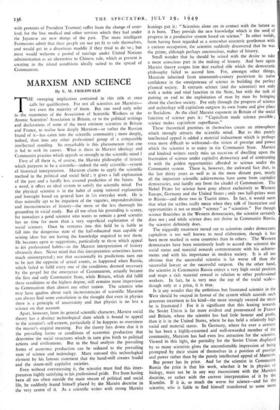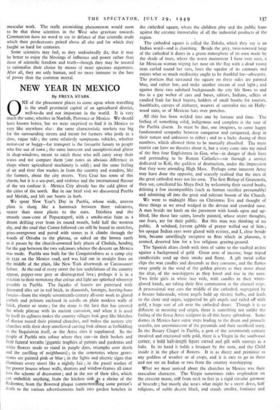MARXISM AND SCIENCE
By E. M. FRIEDWALD
THE sweeping implication contained in - this title at once calls for qualification. For not all scientists are Marxists— not even the majority of them. But one need only refer to the statements of the Association of Scientific Workers or the Atomic Scientists' Association in Britain, or to the political writings and declarations of some of the most eminent scientists in Britain and France, to realise how deeply Marxism—or rather the Russian brand of it—has eaten into the scientific community ; more deeply, indeed, than into any other professional group of a comparable intellectual standing. So remarkable is this phenomenon that one is led to seek its causes. What is there in Marxist ideology and Communist practice which appeals so strongly to the scientific mind ?
First of all there is, of course, the Marxist philosophy of history which purports to be a scientific—indeed the only scientific—system of historical interpretation. Marxism claims to apply the scientific method in the political and social field ; it gives a full explanation of the past and a hardly less assured prediction of the future. In a word, it offers an ideal system to satisfy the scientific mind. For the physical scientist is in the habit of using rational explanation and foresight based on general laws in his everyday work. He is thus naturally apt to be impatient of the vagaries, imponderabilities and inconsistencies of history—the more so the less thorough his grounding in social study. But all too often his grounding is scanty, for nowadays a good scientist who wants to remain a good scientist has no time for more than a very superficial exploration of the social sciences. Once he ventures into this field he is liable to fall into the dangerous state of the half-educated man capable of seizing ideas but not having the knowledge required to test them. He becomes open to suggestions, particularly to those which appeal to his professional habits—as the Marxist interpretation of history obviously does. Never mind that this interpretation sometimes !caves much uninterpretcd ; nor that occasionally its predictions turn out to be just the opposite of actual events, as happened when Russia, which failed to fulfil every one of the conditions deemed necessary by the gospel for the emergence of Communism, actually became the first and only Communist State, while Britain, which did fulfil these conditions to the highest degree, still remains more impervious to Communism than almost any other nation. The scientist who may have qualms about such inconsistencies of scientific Marxism can always find some consolation in the thought that even in physics there is a principle of uncertainty and that physics is no less a science on that account.
Apart, however, from its general scientific character, Marxist social theory has a distinct technological slant which is bound to appeal to the scientist's self-esteem, particularly if he happens to overstress the master's original meaning. For the theory lays down that it is the prevailing forms or conditions of economic production that determine the social structures which in turn give birth to political actions and civilisations: But in the final analysis the prevailing forms of economic production can be reduced to the prevailing state of science and technology. Marx stressed this technological element by his famous statement that the hand-mill creates feudal and the steam-mill capitalist societies.
Even without overstressing it, the scientist must find this inter- pretation highly satisfying to his professional pride. For from having been all too often outside the main stream of political and social life, he suddenly found himself placed by the Marxist doctrine in the very centre of it. As a scientific writer with strong Marxist leanings put it: "Scientists alone are in contact with the future as it is born. They provide the new knowledge which is the seed of progress in a productive system based on science." In other words, from having been regarded as a somewhat eccentric gentleman with a curious occupation, the scientist suddenly discovered that he was the prime, although perhaps unconscious, maker of history.
Small wonder that he should be seized with the desire to take a more conscious part in the making of history. And here again Marxist theory assigns him that exalted role which the democratic philosophy failed to accord him. For, amongst other things, Marxism inherited from nineteenth-century positivism its naive confidence in the omnipotence of science in building the perfect planned society. It entrusts science (and the scientists) not only with a noble and vital function in the State, but with the task of putting an end to the exploitation of man by man by bringing about the classless society. For only through the progress of science and technology will capitalism outgrow its own frame and give place to Socialism. As the chief Marxist exponent in Britain of the social function of science puts it: "Capitalism made science possible; science makes capitalism superfluous."
These theoretical premises in themselves create an atmosphere which strongly attracts the sc:entific mind. But to this purely intellectual appeal is added a material inducement which is perhaps
even more difficult to withstand—the vision of prestige and power which the scientist is to enjoy in the Communist State. Marxist
and kindred writers rarely miss an occasion of dwelling upon the frustration of science under capitalist democracy and of contrasting it with the golden opportunities afforded to science under the Communist system. There is, however, the awkward fact that, in the last thirty years as well as in the more distant past, nearly all the important scientific achievements have come from capitalist democracies, and hardly any from the citadel of Communism. The Nobel Prizes for science have gone almost exclusively to Western Europe, Germany and the United States ; only two half-prizes went to Russia—and those two in Tsarist times. In fact, it would seem that what the scribes really mean when they talk of frustration and opportunities is not so much "science" as "scientists." For though science flourishes in the Western democracies, the scientist certainly does not ; and while science does not thrive in Communist Russia, the scientist definitely does.
The niggardly treatment meted out to scientists under democratic capitalism is too well known to need elaboration, though it has been more marked in some countries than in others. The Western democracies have been notoriously loath to accord the scientist the social status and material rewards commensurate with his achieve- ments and with his importance in modern society. It is all too obvious that the successful scientist is far worse off than the successful lawyer or the successful surgeon. On the other hand,
the scientist in Communist Russia enjoys a very high social position and reaps a rich material reward in relation to other professional workers. In fact, he is very near the top of the social scale— though only at a price, it is true.
Is it any wonder that the ambitious but frustrated scientist in the West should be swayed in favour of the system which accords such generous treatment to his kind—the more strongly swayed the more he is frustrated ? For it is significant that this leaning towards the Soviet Union is far more evident and pronounced in France and Britain, where the scientist has had little honour and profit, than it is in the United States, where he has held a relatively high social and material status. In Germany, where for over a century he has been a highly-esteemed and well-rewarded member of the community, Marxism has had even less attraction for the scientist. Viewed in this light, the partiality for the Soviet Union displayed by so many scientists gives the uncomfortable impression of being prompted by their vision of themselves in a position of prestige and power rather than by the purely intellectual appeal of Marxism. But power has its price. And for the scientist in Commurnst Russia the price is that his work, whether it be in physics or biology, must not be in any way inconsistent with the Marxian doctrine, or rather with the current interpretation of it by the Kremlin. If it is, so much the worse for science—and for the scientist, who is liable to find himself transferred to some more
muscular work. The really astonishing phenomenon would seem to be that those scientists in the West who gravitate towards Communism have no word to say in defence of that scientific truth which their predecessors prized above all else and for which they fought so hard for centuries.
Some scientists may feel, as they undoubtedly do, that it may be better to enjoy the blessings of influence and power rather than those of scientific freedom and truth—though they may be trusted to rationalise their choice by means of more specious arguments. After all, they are only human, and no more immune to the lure of power than the common mortal.



































 Previous page
Previous page